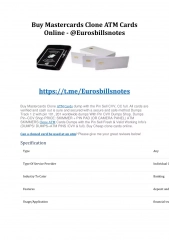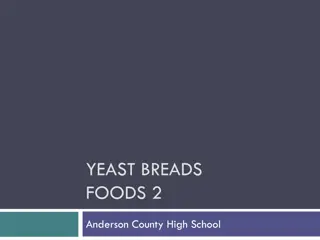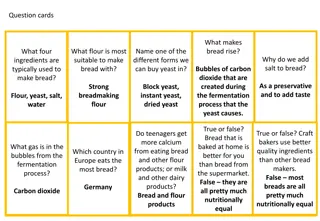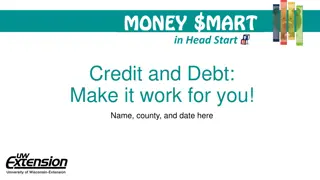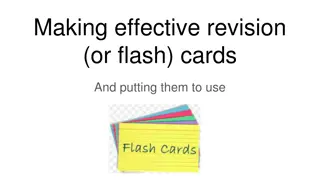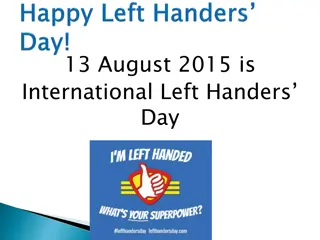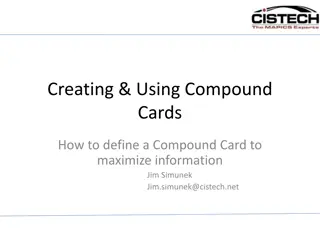Bread Facts and Trivia Question Cards
Explore interesting facts about bread making, ingredients, consumption habits, and origins through a series of trivia questions on different types of bread, essential ingredients, nutritional aspects, and historical backgrounds. Test your knowledge on bread-related topics with these thought-provoking questions!
Download Presentation

Please find below an Image/Link to download the presentation.
The content on the website is provided AS IS for your information and personal use only. It may not be sold, licensed, or shared on other websites without obtaining consent from the author. Download presentation by click this link. If you encounter any issues during the download, it is possible that the publisher has removed the file from their server.
E N D
Presentation Transcript
Question cards What four ingredients are typically used to make bread? What flour is most suitable to make bread with? Name one of the different forms we can buy yeast in? Why do we add salt to bread? What makes bread rise? Do teenagers get more calcium from eating bread and other flour products; or milk and other dairy products? True or false? Bread that is baked at home is better for you than bread from the supermarket. True or false? Craft bakers use better quality ingredients than other bread makers. What gas is in the bubbles from the fermentation process? Which country in Europe eats the most bread?
Question cards If millers weren t able to supply bakers with flour, roughly how long would it be until there was no bread on the shelves? How many times a day is bread collected from the bakery and taken to supermarkets? True or false? Bread contains a range of essential vitamins and minerals. Where is most of the wheat that is milled in the UK grown? True or false? White bread doesn t have any fibre. Mixing, kneading, XXXXX, baking. What stage of the breadmaking process is missing? Do we eat more of less bread in the UK now than we did in the year 2000? How many loaves of bread are made every day in the UK? What percentage of UK household buy bread? Name four types of bread?
Question cards True or false? The process of making bread has not changed since ancient times. Where in the world does Pumpernickel bread originate from? Where in the world does naan bread originate from? Where in the world does soda bread originate from? Where in the world does focaccia bread originate from? What percentage of wheat that UK flour millers produce is made into bread? True or false? Most flour millers and plant bakeries run 24/7. Name one type of bread from France. Name one type of bread from India. Name one type of bread from Italy.
Question cards True or False? Flour is one of the key ingredients used to make bread. Approximately how many loaves of bread are sold each day in the UK? Which of the following types of bread are most commonly eaten in the UK? Which of the following is not considered a key ingredient of bread? Where is bread baked? True or false? Calcium, iron, thiamine (vitamin B1) and niacin (vitamin B3) must be added to all white and brown flour. Which of the following micronutrients does not legally need to be added to white and brown flour? Which of the following is the name used to describe the person that makes flour? Which of the following ingredients helps the bread to rise? In which of the following places is flour made?
Question cards True or false? The dough should be proved in a cool place such as the fridge. True or false? Sugar is added to the bread to help it to rise. Which of the following products contain flour? What is the function of yeast in breadmaking? Where is bread baked? Which of the following types of bread is typically higher in fibre? Which of the following types of bread did not originate in India? Which of the following ingredients helps the bread to rise? Which of the following types of bread originated in Ireland? Which of the following is a type of bread stick?




